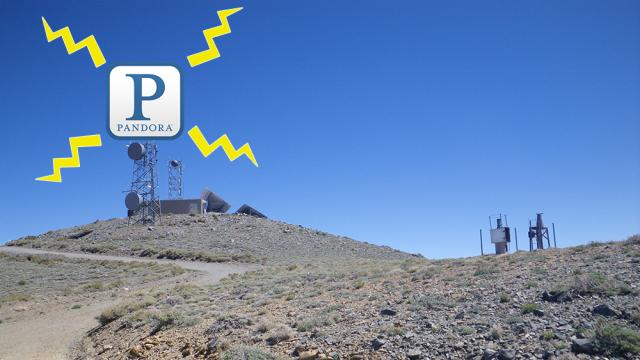Yesterday, news emerged that Pandora had acquired an FM radio station in South Dakota for an undisclosed sum. Yes, you read that right. The world’s largest internet radio station is getting into the terrestrial radio business, and it’s not because Pandora’s trying to build out its antique antenna collection.
Either Pandora’s trying to save money on licensing fees in order to improve its service, which is way the company says it’s doing, or Pandora’s staging some weird internet-meets-Earth publicity stunt, which is what it seems like the company is doing.
Pandora has been upfront about its stated intentions. The company’s assistant general counsel, Christopher Harrison, explained the reasoning of buying the radio station on The Hill‘s Congress Blog. There’s a whole lot about Pandora’s present battle with folks like the American Society of Composers, Authors and Publishers (ASCAP) over licensing fees and a sly mention of how terrestrial radio stations are given “preferential treatment” thanks to an agreement from January 2012. You don’t even have to read between the lines to figure out how Pandora’s trying to game the system that’s enabling competitors like Clear Channel’s iHeartRadio to pay lower licensing fees.
That makes good sense for Pandora. Why wouldn’t the makers of the Music Genome Project want some sort of advantage in the increasingly crowded internet radio business? Despite being a decade old, Pandora has far fewer subscribers than competitors like, say, Spotify. But Harrison suggests that Pandora’s ability to innovate and offer more to listeners is hindered by the evil ASCAP and friends who “seek to impose unprecedented royalty increases that are neither reasonable nor competitive.” And although some tech bloggers are trying to connect Pandora’s move to Apple’s iRadio announcement earlier this week, the company’s actually been working on this plan to buy an AM or FM radio station for at least six months. So this was no rash decision.
There is a second layer to this Pandora-goes-terrestrial idea. The company is also trying to convince everyone that this about “the community” and not just pleasing their money-hungry investors. In his blog post, Harrison includes this splendid nugget of nonsense:
While this might seem like an unexpected move for Pandora, it makes sense even beyond the licensing parity. Pandora excels in personalizing discovery and terrestrial radio is experienced in integrating with a local community. We look forward to broadcasting our personalised experience to the community in Rapid City, an area where over 42,000 residents already use Pandora.
How is Pandora going to broadcast personalised radio to a whole town? Does everybody get one song a week that’s just for them? Can they click thumbs up or thumbs down from their car stereo? How is an FM station in South Dakota going to make Pandora better for everyone?
Don’t waste your time wondering about all those questions because we’ll make this really simple. Despite its stated intentions to make its service better and please “the community,” it also seems like Pandora bought a radio station in South Dakota as a big publicity stunt in an attempt to highlight its plight with the record industry which is still stubbornly trying to make money for its artists. If so, this means that you probably won’t notice any difference between Pandora’s offerings now and its offerings in six months.
Just to be clear, the potential benefits of the deal are very real. If everything works out as Harrison says it should, owning a terrestrial radio station will make Pandora exempt from a rule that would allow record labels to selectively withdraw specific songs from licensing agreements. (There’s actually a legal battle between ASCAP and Pandora going on in the background.) But Pandora didn’t need to buy a radio station to fight that battle. But the headlines it’s winning for doing something sort of quirky are worth far more than the price of the station.
The new Pandora FM or whatever they end up calling this radio station isn’t for everybody, though. At least not according to the Rapid City station’s recent history it’s now. Right now, the station’s known as KXMZ and locally famous for morning DJ Mike Swafford. Its tagline: “Today’s best hits without the rap.”
Picture: Flickr
